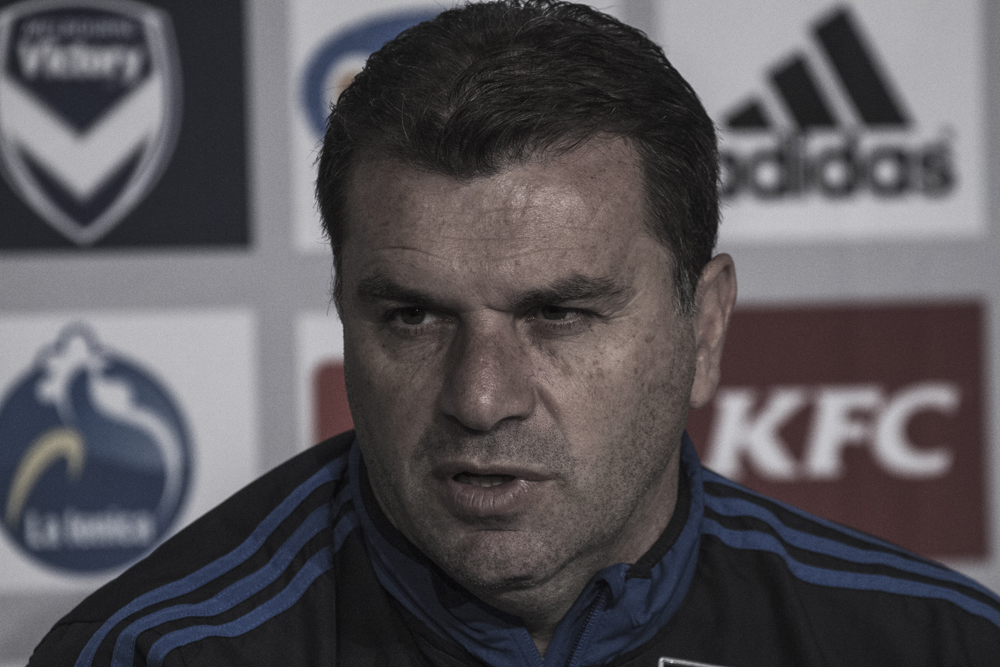Though it may prove little consolation after losing Australia’s most successful coach to the national team, Melbourne Victory fans seething at Ange Postecoglou’s departure highlight the A-league’s growing influence in Australia. Such a deep connection with a club to only demand the best from it proves the Socceroos may not necessarily be the top national priority anymore.
Regardless, Postecoglou is the right man for the job. Those calling for big name overseas coaches are missing the point. A Hiddink-esque quick fix is not the solution the Socceroos currently require and a strong showing at Rio 2014 is no longer the FFA’s sole focus. Postecoglou’s mission extends well beyond Brazil, which includes building a new-look team to challenge for the 2015 Asian Cup on home soil and qualifying for Russia 2018.
It is highly unlikely a foreign coach, despite the length of their CV, would have the same vested interest, knowledge of local players, or passion for Australian football to commit to such a long-term project. Postecoglou has displayed the willingness and desire required to undertake such a monumental challenge.
But where to now for the Victory? The pursuit and capture of Postecoglou was meant to be the silver lining of a post-Ernie Merrick era blighted by the Harry Kewell saga, poor results and eventual departure of two more coaches. His 18 months in charge oversaw a new culture, a semi-final, and a promising new season. Yet Ange, too, is now gone.
Victory can be seen somewhat as victims of their own success. The FFA seem to give an impression that ‘Victory are established enough to be self-sustainable, and their support will always remain’, despite challenges thrown at them. Yet the $50,000-$150,000 ‘transitional fee’ falling well short of the $1m demanded (if there was any compensation at all), match atmosphere subdued by restrictions aimed at the Northern Terrace, and late membership pack arrivals have supporters rightly feeling aggrieved at the board once more.
However, the blueprint is in place for Kevin Muscat to succeed Postecoglou as head coach. Again, calls to find a foreign replacement are misguided. There is no need for a rebuild or a new style. Continuation is key. As Victory midfielder Mitch Nichols said on Tuesday, “we’ve done too much work already… to change. It would be like starting from scratch.” Muscat, with the aid of Darren Davies, already successfully applying the same system to Victory’s youth team, are the men to lead the club forward.
There have always been perceptions of Muscat as the ‘old soccer’ type to play an unabashed, physical game style with little tactical regard. The former Victory hard man is associated with the Merrick, Mehmet Durakovic and Jim Magilton eras that perhaps relied on star players rather than revolutionary tactics to win games. Indications of poor man management arose when Carlos Hernandez, upon his departure from the club, said “the assistant was the one running the show, and giving priority to his ‘mates’ in the line-up.” Many thought Muscat would be the first released from the club when Postecoglou arrived.
But Postecoglou saw a Melbourne man passionate to see his club succeed. An 18 month apprenticeship under the head coach’s guidance, with a very active role as assistant, should serve Muscat well, and by all accounts he is more tactically astute than people give him credit for. Time will tell on this count perhaps.
As for players like Nichols and captain Mark Milligan, whose presence at Victory can be attributed to loyalty to Postecoglou, the idea of playing a World Cup under him will be more than enough motivation to keep them striving for success.

